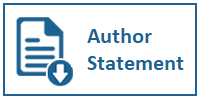PENGARUH OPPORTUNISTIC BEHAVIOUR, LEVERAGE, FINANCIAL DISTRESS TERHADAP EARNINGS MANAGEMENT
DOI:
https://doi.org/10.31937/akuntansi.v13i1.1947Abstract
Abstract” The purpose of this study is to examine the effect of opportunistic behavior, leverage, financial distress on earnings management. Samples were obtained from non-financial companies that reported financial reports in a row from 2010-2019 with a purposive sampling method, so as to obtain data as much as 232 observations. Earnings management is measured using the Kothari (2005) model, opportunistic behavior consisting of free cash flow (FCF) as measured by the Lehn & Poulsen method (1989) and profitability as measured by Return on Assets (ROA), leverage is measured by Debt Ratio and financial distress. measured by Zmijewski's (1984) model during the study period. Data were tested using multiple linear regression through the STATA program. The results showed that opportunistic behavior as proxied by profitability can increase managers' motivation towards earnings management, as well as leverage. However, opportunistic behavior as proxied by free cash flow is not in accordance with predictions, while financial distress has no significant effect on earnings management.
Keywords: Earnings Management; Opportunistic Behaviour; Leverage; Financial Distress; Zmijewski Model
Downloads
Downloads
Published
How to Cite
Issue
Section
License
Authors retain copyright and grant the journal right of first publication with the work simultaneously licensed under a Creative Commons Attribution-ShareAlike International License (CC-BY-SA 4.0) that allows others to share the work with an acknowledgement of the work's authorship and initial publication in this journal.
Authors are able to enter into separate, additional contractual arrangements for the non-exclusive distribution of the journal's published version of the work (e.g., post it to an institutional repository or publish it in a book), with an acknowledgement of its initial publication in this journal.
















